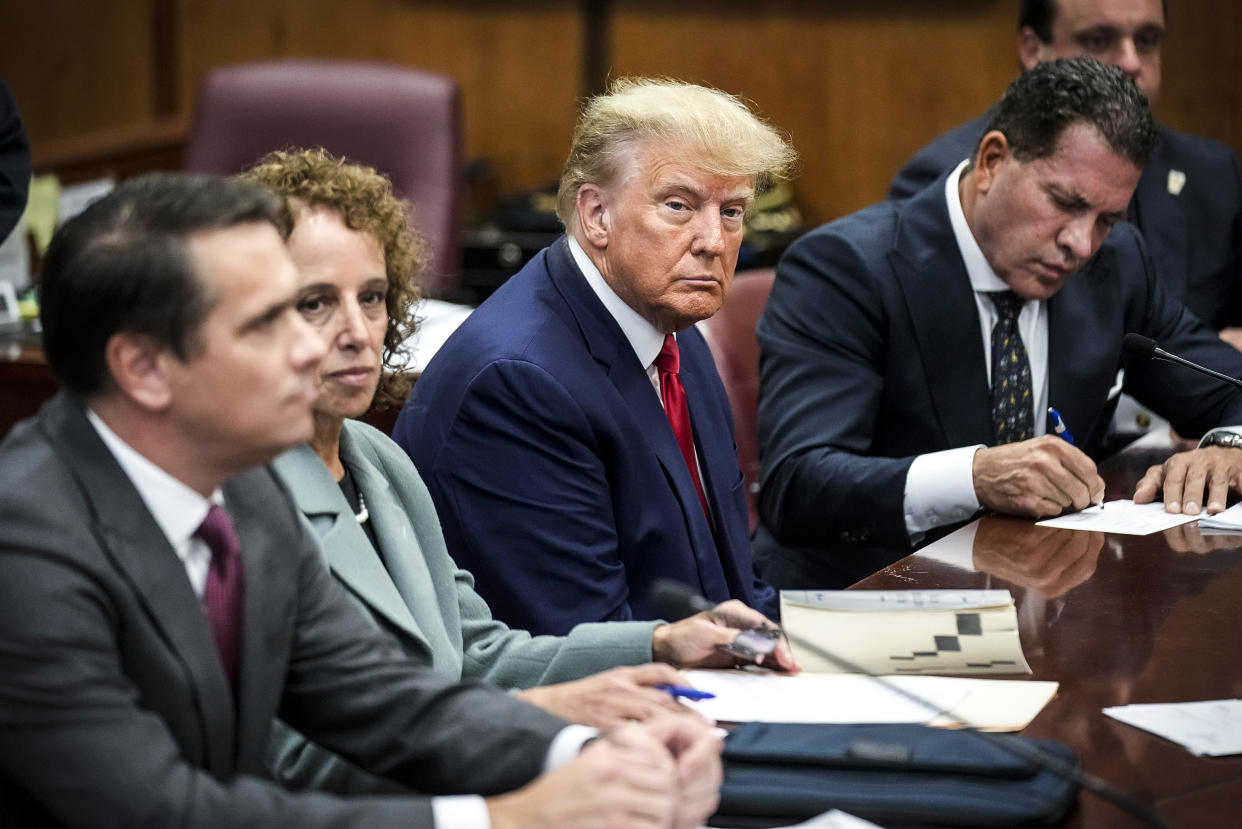Trump's N.Y. criminal trial will begin in March 2024, halfway through presidential primaries
Former President Donald Trump made a virtual appearance in New York criminal court on Tuesday for the first time since pleading not guilty last month to 34 felony counts of falsifying business records.
A stern-looking Trump appeared before Judge Juan Merchan on video to hear the terms of a protective order barring him from publicly disclosing evidence, which the Manhattan district attorney's office will be turning over to his lawyers in the hush money payments case. Trump — whose in-person arraignment in the same courthouse last month came with massive security precautions and paralyzed operations there for the day — appeared virtually from Florida, with lawyer Todd Blanche at his side.
Merchan also set a trial date in the case — March 25, 2024. By that time, at least 25 states will have already held their presidential primary contests, based on the current scheduled dates.
Asked by the judge if he had a copy of the order, Trump said, "Yes, sir," and acknowledged he'd reviewed it with his lawyer.
Blanche told Merchan that Trump is a "leading contender" in the presidential race and is "concerned his First Amendment rights are being violated." Merchan said the directive "is not a gag order" and should not interfere with his ability to run for office.
"He is free to campaign and do anything that does not violate the order," the judge said.
Blanche said his client "understands he needs to comply" with the order.
Prosecutors had argued the virtual appearance was necessary to keep Trump from releasing confidential information in the case and then claim he hadn't been familiar with the terms of the order.

"Should Defendant violate the terms of any protective order issued by the Court, the People may seek to enforce its terms by initiating a prosecution for Criminal Contempt in the Second Degree," the DA's office said in a court filing last month, and in "advancing such a prosecution, the People will be required to show that Defendant had knowledge of the contents of the order."
Trump's lawyers argued in court filings that the protective order was “extremely restrictive” and that what prosecutors were proposing “would be an unprecedented and extraordinarily broad muzzle on a leading contender for the presidency of the United States.”
But Merchan ruled largely in the DA's favor on the issue earlier this month. His order held that anyone with access to the evidence being turned over to Trump’s team by state prosecutors “shall not copy, disseminate or disclose” the material to third parties, including social media platforms, “without prior approval from the court.”
Merchan's order also singled out Trump, saying he is allowed to review sensitive “Limited Dissemination Materials” only in the presence of his lawyers and “shall not be permitted to copy, photograph, transcribe, or otherwise independently possess the Limited Dissemination Materials.”
Prosecutors from Manhattan District Attorney Alvin Bragg's office contended the order was necessary in part because of Trump's repeated public trashing of two of the witnesses for their case, former Trump attorney Michael Cohen and adult film star Stormy Daniels.
NBC News has reached out to lawyers for Trump and a spokesperson for the DA's office for comment about Tuesday’s hearing.
Trump has been charged with falsifying business records related to hush money payments to Daniels and another woman toward the end of his 2016 presidential campaign in order to prevent them from speaking about their allegations of affairs with him. He has pleaded not guilty and has said he did not have an extramarital affair with either woman.
Cohen pleaded guilty to charges related to the payments as well as other criminal charges in 2018, and was sentenced to three years in prison. He's been outspoken about his cooperation with the DA's office and in his criticism of his former boss.
In a statement Tuesday, Cohen said, “I have less than zero confidence that Donald will abide by any of the terms of the Protective Order. His anger towards the system that is holding him accountable is so severe, he will not be able to control his actions. He is like a petulant child.”
In a court filing last week, the DA's office rejected a request from Trump's team for more information about some of the legal theory behind their case.
Trump’s attorneys had asked for information, known as a bill of particulars, in a bid to find out more about the evidence against him, including the legal rationale for charging the falsified records as a felony instead of a misdemeanor.
Under New York law, in order to elevate the charge to a felony, the defendant needs to have created the fake records with an intent to commit or conceal “another crime.”
Prosecutors said they've already turned over and will continue to turn over more evidence than they're legally required to, and said Trump's lawyers aren't entitled to more. “The indictment need not identify any particular crime that the defendant intended to commit or conceal, and the defendant is not entitled to such information in a bill of particulars," they added.
Trump has complained that the criminal case brought by the Democratic DA is part of a partisan "witch hunt" against him, and claimed Merchan, a state criminal court judge sitting in Manhattan, "hates me."
Trump's lawyers filed paperwork earlier this month seeking to have the case transferred to federal court. That request is pending.
